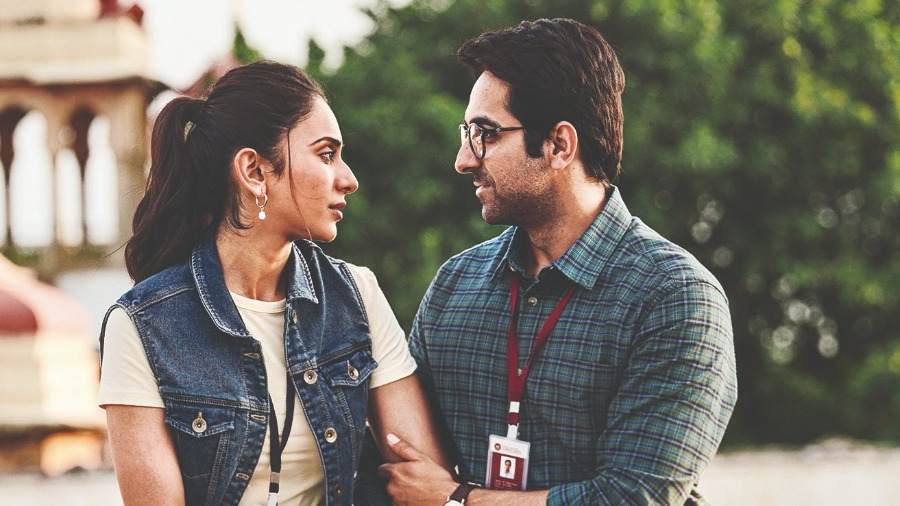By the interval of Doctor G, I realised that the story of this film is not just about a boy becoming a gynaecologist. It must be about something more than that. But what exactly? That question lingered even after the film ended. What exactly did the writers and the director wanted to say? Was it about schooling a chauvinist male from the heartland of India to be able to understand women? Because the girl in Doctor G, Fatima (Rakul Preet Singh), says out loud to the guy, Uday (Ayushmann Khurrana): “Tumhe ladkiyon ki baatein sunai nahin deti.” (You don’t/ don’t want to listen to what a girl is saying).
Well, the schooling begins from the first scene itself with Uday’s chaddi buddy – literally nicknamed Chaddi — when Uday tells him that he’s not okay with his girlfriend spending more time with her friend, Vishal, and that she might be having sex with him too. Chaddi says that he too spends most of his time with Uday, so should Uday and he have sex too? If only relationships were that easy. Anyone, boy or girl, gay or straight, is going to feel a little insecure when their BF/GF grows closer with someone else.
Uday wants to become an orthopaedist like his distant cousin brother, Ashok (Indranil Sengupta). Uday idolises Ashok. When he sees that Ashok is courting an underage girl, he’s slightly taken aback but doesn’t say much. You know where this might be heading. And credit to the makers for handling this sensitive track the way they did. The end of it is rewarding and sort of coming-of-age for Uday, like some other moments in the film.
The sequences where he’s being integrated into the gynaecology department and being ragged by girls are playful. The schooling on masculinity continues throughout the film. After a point, it becomes so preachy and one-sided that I stopped caring. So, what worked for me and what didn’t in this schooling? The sequence of Uday losing the male touch and learning the doctor touch is smartly written, and a solid Shefali Shah as the HOD of the gynae department teaches that to Uday.
I don’t have a problem with films that try to tap into many issues in those two hours as long as the narrative doesn’t seem contrived. Barring a couple of sequences mentioned above, Doctor G seems contrived. The lines are said to make a point or preach. They don’t come organically.
Take this for instance. Fatima looks like a character. She could have been a Shalini or Maria, and that wouldn’t have made any difference but when she casually says, “Hey Ram” to which Uday says, “Fatima tumhare munh se Hey Ram sunna kitna cool lagta hai.” It looks like it was added to preach inclusivity. Fatima was Fatima, until the line pointed out that she’s Muslim. Get it?
As for the performances, all the actors are in good form. Shefali Shah makes hers look like a cakewalk. She could perform such characters even in her sleep. Ayushmann’s Uday is cruelly two-dimensional, but the actor adds life to the character. Ayushmann must have been the obvious choice to play this role as the film falls in the subgenre, i.e. Ayushmann Khurrana. Rakul Preet Singh is charismatic as Fatima. The girl gang in the gynae department is cast well. But my favourite of the lot is the ever-so-reliable and striking Sheeba Chaddha as Uday’s mother.
As for the technicalities, the camera goes soft focus in some scenes early on in the film. It doesn’t seem intentional though. The uneven writing makes it difficult for the editor to maintain a smooth transition from one scene to another. The film is shot in an overexposed Madhya Pradesh. These days small town films are either shot in MP or UP. And no song really stayed with me after I left the theatre.
Because this film has a lot of schooling on masculinity and gender, I was disturbed by the way Uday and Fatima’s connection has been handled. Fatima (engaged to be married) and Uday share a passionate kiss at the end of a medical camp. The next day, she ‘clears it’ that it was just one moment of passion. Let’s just stay the way we are (like they always say). She wants him in her life, but as a friend.
Uday is anyway unsure about what he feels about anything. Fatima wants him in his life but as a friend. Staying just friends after sharing a kiss is going to be difficult for many boys and girls. Uday is going to find it difficult to digest and simply move on as if nothing has happened. Fatima schools him further on quite a few occasions that – in short – he’s not progressive enough: “Tumhe ladkiyon ki baat sunai hee nahin deti.”
The sequence and the culmination play out as the man here needs to grow up. But I wonder what if the gender table was turned and the guy had asked the girl to just be friends because he wants her in his life but ‘just as a friend’? He’d easily be labelled commitment-phobic or a player. That aspect of sexism nobody talks about. Maybe some film in the future will do.










